Palliative Care: Cultural, Ethical, and Practical Considerations
VerifiedAdded on 2023/06/03
|9
|2347
|268
Essay
AI Summary
This essay provides a comprehensive overview of palliative care, encompassing its philosophical underpinnings, various care settings (home, hospice, and hospital), and cultural perspectives, particularly focusing on the Chinese context. The essay delves into the nursing code of ethics, including autonomy, non-maleficence, beneficence, and justice, and their application in palliative care. Furthermore, it addresses nursing care responsibilities after death and during bereavement, including body preservation, cultural and religious considerations, and support for the bereaved. The essay highlights the importance of holistic, patient-centered care that addresses physical, emotional, social, and spiritual needs, emphasizing the role of health education and cultural sensitivity in improving end-of-life care.
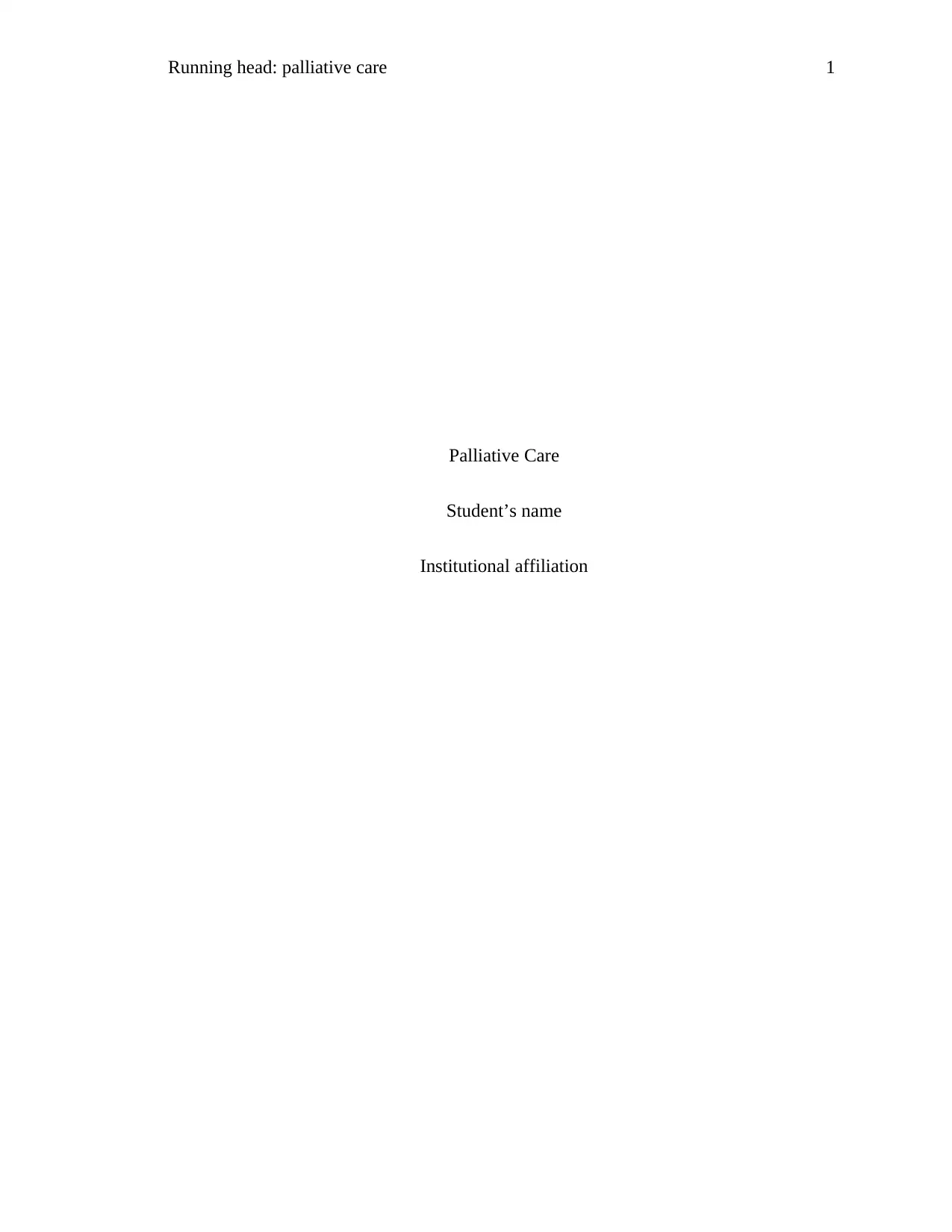
Running head: palliative care 1
Palliative Care
Student’s name
Institutional affiliation
Palliative Care
Student’s name
Institutional affiliation
Paraphrase This Document
Need a fresh take? Get an instant paraphrase of this document with our AI Paraphraser
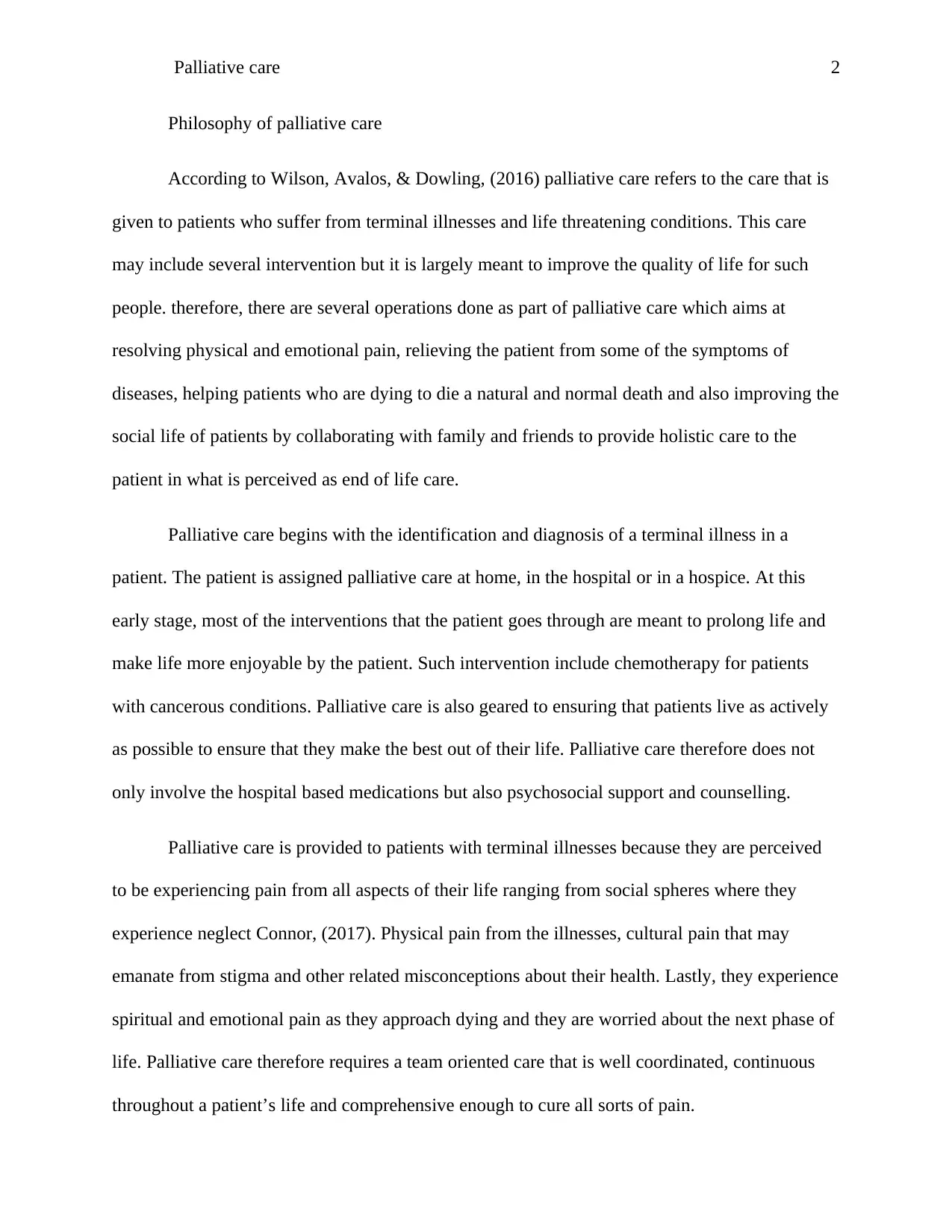
Palliative care 2
Philosophy of palliative care
According to Wilson, Avalos, & Dowling, (2016) palliative care refers to the care that is
given to patients who suffer from terminal illnesses and life threatening conditions. This care
may include several intervention but it is largely meant to improve the quality of life for such
people. therefore, there are several operations done as part of palliative care which aims at
resolving physical and emotional pain, relieving the patient from some of the symptoms of
diseases, helping patients who are dying to die a natural and normal death and also improving the
social life of patients by collaborating with family and friends to provide holistic care to the
patient in what is perceived as end of life care.
Palliative care begins with the identification and diagnosis of a terminal illness in a
patient. The patient is assigned palliative care at home, in the hospital or in a hospice. At this
early stage, most of the interventions that the patient goes through are meant to prolong life and
make life more enjoyable by the patient. Such intervention include chemotherapy for patients
with cancerous conditions. Palliative care is also geared to ensuring that patients live as actively
as possible to ensure that they make the best out of their life. Palliative care therefore does not
only involve the hospital based medications but also psychosocial support and counselling.
Palliative care is provided to patients with terminal illnesses because they are perceived
to be experiencing pain from all aspects of their life ranging from social spheres where they
experience neglect Connor, (2017). Physical pain from the illnesses, cultural pain that may
emanate from stigma and other related misconceptions about their health. Lastly, they experience
spiritual and emotional pain as they approach dying and they are worried about the next phase of
life. Palliative care therefore requires a team oriented care that is well coordinated, continuous
throughout a patient’s life and comprehensive enough to cure all sorts of pain.
Philosophy of palliative care
According to Wilson, Avalos, & Dowling, (2016) palliative care refers to the care that is
given to patients who suffer from terminal illnesses and life threatening conditions. This care
may include several intervention but it is largely meant to improve the quality of life for such
people. therefore, there are several operations done as part of palliative care which aims at
resolving physical and emotional pain, relieving the patient from some of the symptoms of
diseases, helping patients who are dying to die a natural and normal death and also improving the
social life of patients by collaborating with family and friends to provide holistic care to the
patient in what is perceived as end of life care.
Palliative care begins with the identification and diagnosis of a terminal illness in a
patient. The patient is assigned palliative care at home, in the hospital or in a hospice. At this
early stage, most of the interventions that the patient goes through are meant to prolong life and
make life more enjoyable by the patient. Such intervention include chemotherapy for patients
with cancerous conditions. Palliative care is also geared to ensuring that patients live as actively
as possible to ensure that they make the best out of their life. Palliative care therefore does not
only involve the hospital based medications but also psychosocial support and counselling.
Palliative care is provided to patients with terminal illnesses because they are perceived
to be experiencing pain from all aspects of their life ranging from social spheres where they
experience neglect Connor, (2017). Physical pain from the illnesses, cultural pain that may
emanate from stigma and other related misconceptions about their health. Lastly, they experience
spiritual and emotional pain as they approach dying and they are worried about the next phase of
life. Palliative care therefore requires a team oriented care that is well coordinated, continuous
throughout a patient’s life and comprehensive enough to cure all sorts of pain.
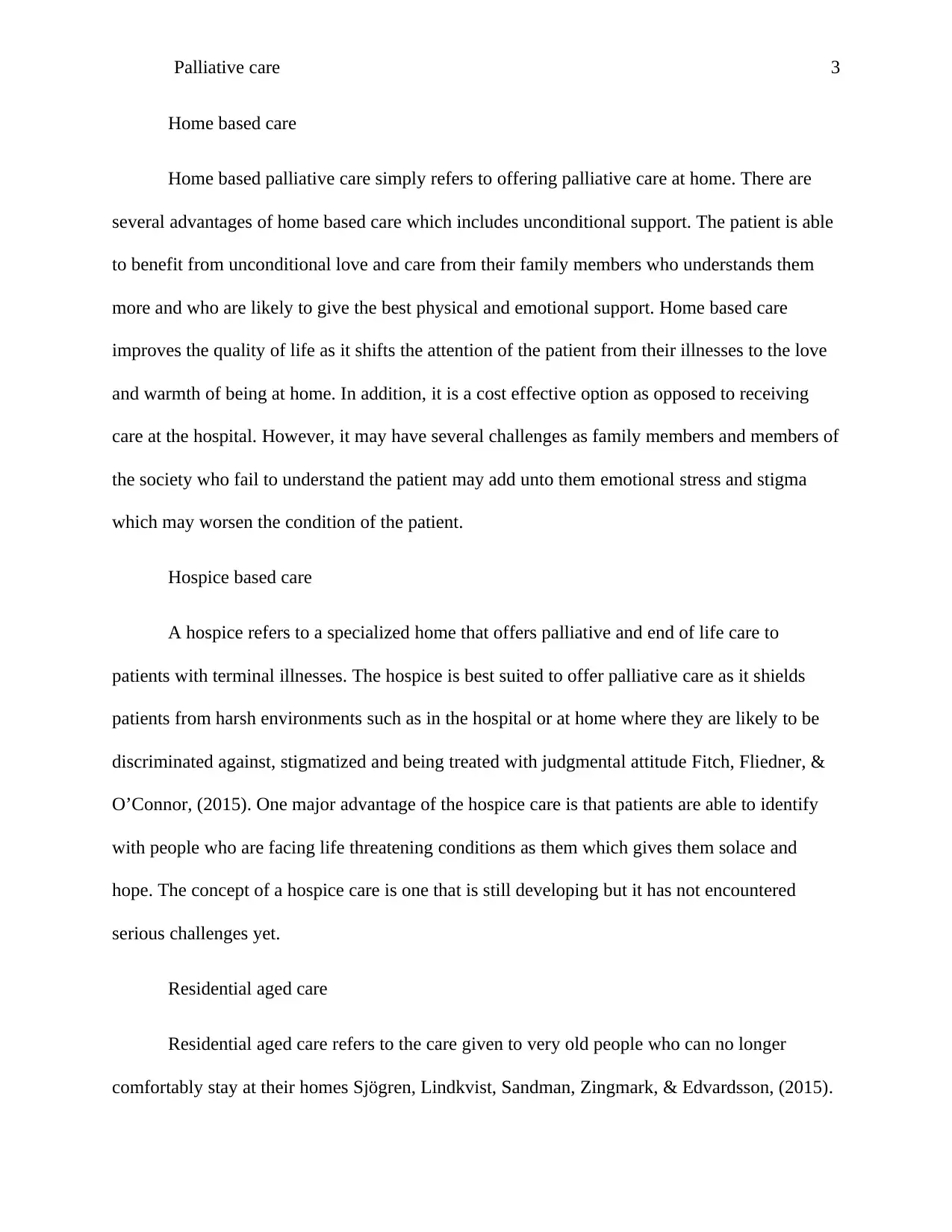
Palliative care 3
Home based care
Home based palliative care simply refers to offering palliative care at home. There are
several advantages of home based care which includes unconditional support. The patient is able
to benefit from unconditional love and care from their family members who understands them
more and who are likely to give the best physical and emotional support. Home based care
improves the quality of life as it shifts the attention of the patient from their illnesses to the love
and warmth of being at home. In addition, it is a cost effective option as opposed to receiving
care at the hospital. However, it may have several challenges as family members and members of
the society who fail to understand the patient may add unto them emotional stress and stigma
which may worsen the condition of the patient.
Hospice based care
A hospice refers to a specialized home that offers palliative and end of life care to
patients with terminal illnesses. The hospice is best suited to offer palliative care as it shields
patients from harsh environments such as in the hospital or at home where they are likely to be
discriminated against, stigmatized and being treated with judgmental attitude Fitch, Fliedner, &
O’Connor, (2015). One major advantage of the hospice care is that patients are able to identify
with people who are facing life threatening conditions as them which gives them solace and
hope. The concept of a hospice care is one that is still developing but it has not encountered
serious challenges yet.
Residential aged care
Residential aged care refers to the care given to very old people who can no longer
comfortably stay at their homes Sjögren, Lindkvist, Sandman, Zingmark, & Edvardsson, (2015).
Home based care
Home based palliative care simply refers to offering palliative care at home. There are
several advantages of home based care which includes unconditional support. The patient is able
to benefit from unconditional love and care from their family members who understands them
more and who are likely to give the best physical and emotional support. Home based care
improves the quality of life as it shifts the attention of the patient from their illnesses to the love
and warmth of being at home. In addition, it is a cost effective option as opposed to receiving
care at the hospital. However, it may have several challenges as family members and members of
the society who fail to understand the patient may add unto them emotional stress and stigma
which may worsen the condition of the patient.
Hospice based care
A hospice refers to a specialized home that offers palliative and end of life care to
patients with terminal illnesses. The hospice is best suited to offer palliative care as it shields
patients from harsh environments such as in the hospital or at home where they are likely to be
discriminated against, stigmatized and being treated with judgmental attitude Fitch, Fliedner, &
O’Connor, (2015). One major advantage of the hospice care is that patients are able to identify
with people who are facing life threatening conditions as them which gives them solace and
hope. The concept of a hospice care is one that is still developing but it has not encountered
serious challenges yet.
Residential aged care
Residential aged care refers to the care given to very old people who can no longer
comfortably stay at their homes Sjögren, Lindkvist, Sandman, Zingmark, & Edvardsson, (2015).
⊘ This is a preview!⊘
Do you want full access?
Subscribe today to unlock all pages.

Trusted by 1+ million students worldwide
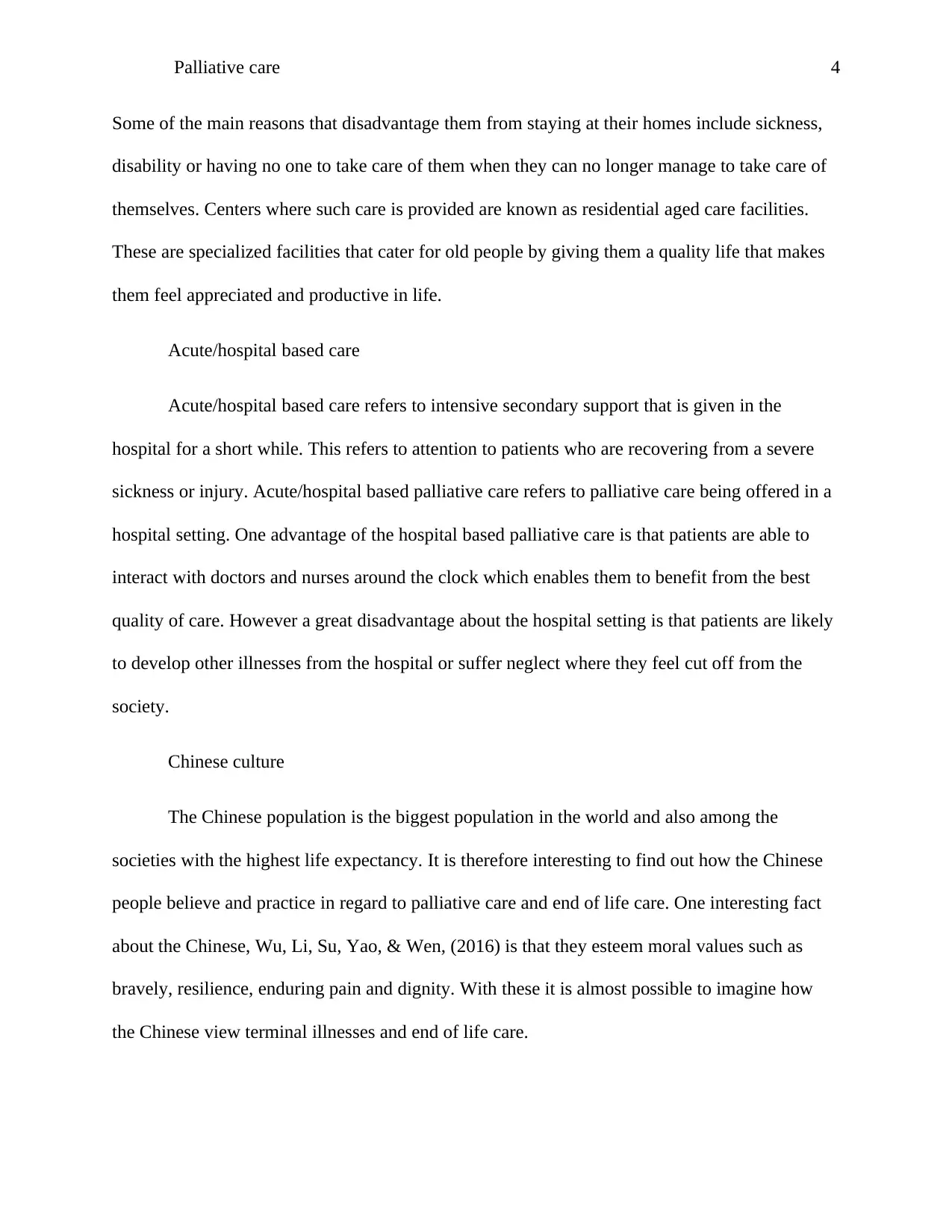
Palliative care 4
Some of the main reasons that disadvantage them from staying at their homes include sickness,
disability or having no one to take care of them when they can no longer manage to take care of
themselves. Centers where such care is provided are known as residential aged care facilities.
These are specialized facilities that cater for old people by giving them a quality life that makes
them feel appreciated and productive in life.
Acute/hospital based care
Acute/hospital based care refers to intensive secondary support that is given in the
hospital for a short while. This refers to attention to patients who are recovering from a severe
sickness or injury. Acute/hospital based palliative care refers to palliative care being offered in a
hospital setting. One advantage of the hospital based palliative care is that patients are able to
interact with doctors and nurses around the clock which enables them to benefit from the best
quality of care. However a great disadvantage about the hospital setting is that patients are likely
to develop other illnesses from the hospital or suffer neglect where they feel cut off from the
society.
Chinese culture
The Chinese population is the biggest population in the world and also among the
societies with the highest life expectancy. It is therefore interesting to find out how the Chinese
people believe and practice in regard to palliative care and end of life care. One interesting fact
about the Chinese, Wu, Li, Su, Yao, & Wen, (2016) is that they esteem moral values such as
bravely, resilience, enduring pain and dignity. With these it is almost possible to imagine how
the Chinese view terminal illnesses and end of life care.
Some of the main reasons that disadvantage them from staying at their homes include sickness,
disability or having no one to take care of them when they can no longer manage to take care of
themselves. Centers where such care is provided are known as residential aged care facilities.
These are specialized facilities that cater for old people by giving them a quality life that makes
them feel appreciated and productive in life.
Acute/hospital based care
Acute/hospital based care refers to intensive secondary support that is given in the
hospital for a short while. This refers to attention to patients who are recovering from a severe
sickness or injury. Acute/hospital based palliative care refers to palliative care being offered in a
hospital setting. One advantage of the hospital based palliative care is that patients are able to
interact with doctors and nurses around the clock which enables them to benefit from the best
quality of care. However a great disadvantage about the hospital setting is that patients are likely
to develop other illnesses from the hospital or suffer neglect where they feel cut off from the
society.
Chinese culture
The Chinese population is the biggest population in the world and also among the
societies with the highest life expectancy. It is therefore interesting to find out how the Chinese
people believe and practice in regard to palliative care and end of life care. One interesting fact
about the Chinese, Wu, Li, Su, Yao, & Wen, (2016) is that they esteem moral values such as
bravely, resilience, enduring pain and dignity. With these it is almost possible to imagine how
the Chinese view terminal illnesses and end of life care.
Paraphrase This Document
Need a fresh take? Get an instant paraphrase of this document with our AI Paraphraser
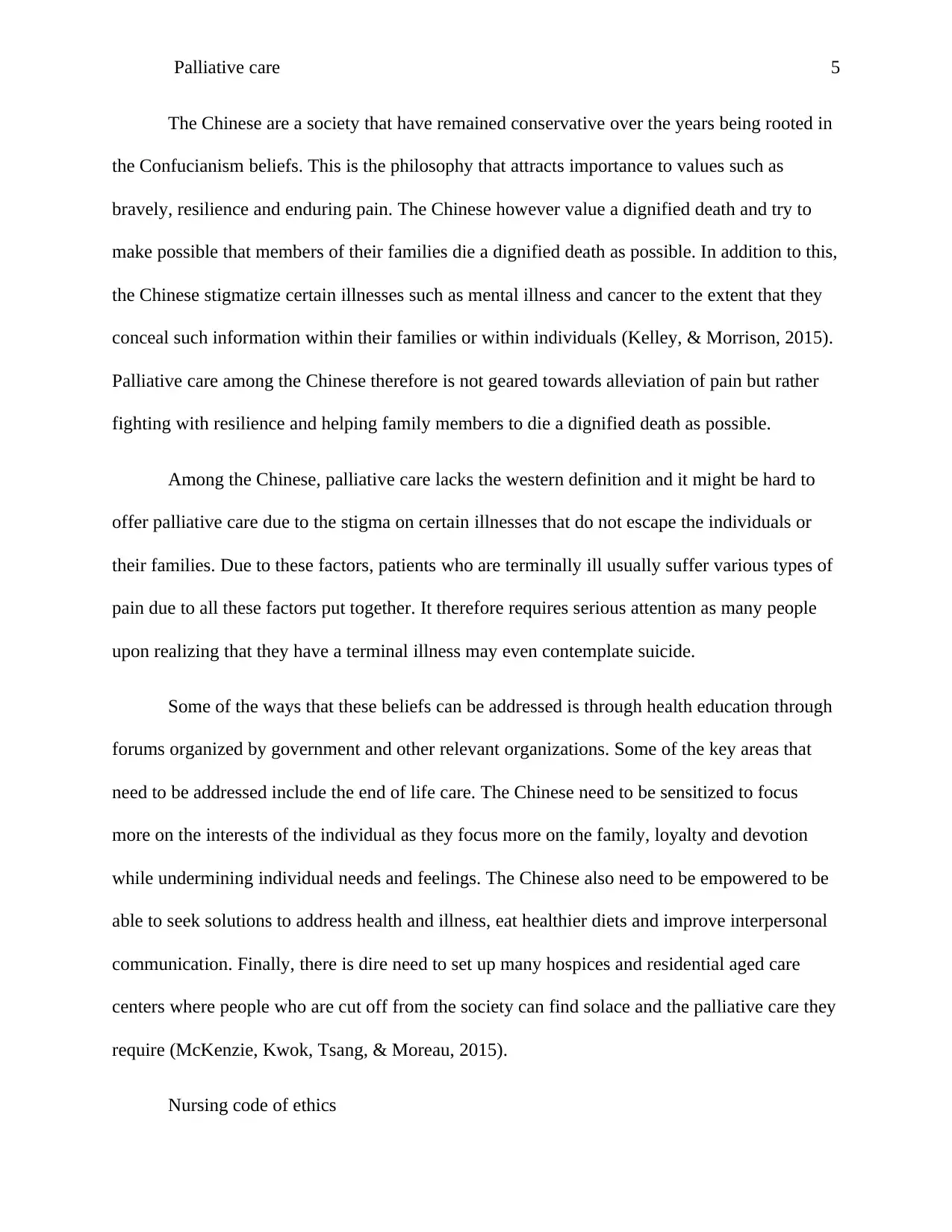
Palliative care 5
The Chinese are a society that have remained conservative over the years being rooted in
the Confucianism beliefs. This is the philosophy that attracts importance to values such as
bravely, resilience and enduring pain. The Chinese however value a dignified death and try to
make possible that members of their families die a dignified death as possible. In addition to this,
the Chinese stigmatize certain illnesses such as mental illness and cancer to the extent that they
conceal such information within their families or within individuals (Kelley, & Morrison, 2015).
Palliative care among the Chinese therefore is not geared towards alleviation of pain but rather
fighting with resilience and helping family members to die a dignified death as possible.
Among the Chinese, palliative care lacks the western definition and it might be hard to
offer palliative care due to the stigma on certain illnesses that do not escape the individuals or
their families. Due to these factors, patients who are terminally ill usually suffer various types of
pain due to all these factors put together. It therefore requires serious attention as many people
upon realizing that they have a terminal illness may even contemplate suicide.
Some of the ways that these beliefs can be addressed is through health education through
forums organized by government and other relevant organizations. Some of the key areas that
need to be addressed include the end of life care. The Chinese need to be sensitized to focus
more on the interests of the individual as they focus more on the family, loyalty and devotion
while undermining individual needs and feelings. The Chinese also need to be empowered to be
able to seek solutions to address health and illness, eat healthier diets and improve interpersonal
communication. Finally, there is dire need to set up many hospices and residential aged care
centers where people who are cut off from the society can find solace and the palliative care they
require (McKenzie, Kwok, Tsang, & Moreau, 2015).
Nursing code of ethics
The Chinese are a society that have remained conservative over the years being rooted in
the Confucianism beliefs. This is the philosophy that attracts importance to values such as
bravely, resilience and enduring pain. The Chinese however value a dignified death and try to
make possible that members of their families die a dignified death as possible. In addition to this,
the Chinese stigmatize certain illnesses such as mental illness and cancer to the extent that they
conceal such information within their families or within individuals (Kelley, & Morrison, 2015).
Palliative care among the Chinese therefore is not geared towards alleviation of pain but rather
fighting with resilience and helping family members to die a dignified death as possible.
Among the Chinese, palliative care lacks the western definition and it might be hard to
offer palliative care due to the stigma on certain illnesses that do not escape the individuals or
their families. Due to these factors, patients who are terminally ill usually suffer various types of
pain due to all these factors put together. It therefore requires serious attention as many people
upon realizing that they have a terminal illness may even contemplate suicide.
Some of the ways that these beliefs can be addressed is through health education through
forums organized by government and other relevant organizations. Some of the key areas that
need to be addressed include the end of life care. The Chinese need to be sensitized to focus
more on the interests of the individual as they focus more on the family, loyalty and devotion
while undermining individual needs and feelings. The Chinese also need to be empowered to be
able to seek solutions to address health and illness, eat healthier diets and improve interpersonal
communication. Finally, there is dire need to set up many hospices and residential aged care
centers where people who are cut off from the society can find solace and the palliative care they
require (McKenzie, Kwok, Tsang, & Moreau, 2015).
Nursing code of ethics
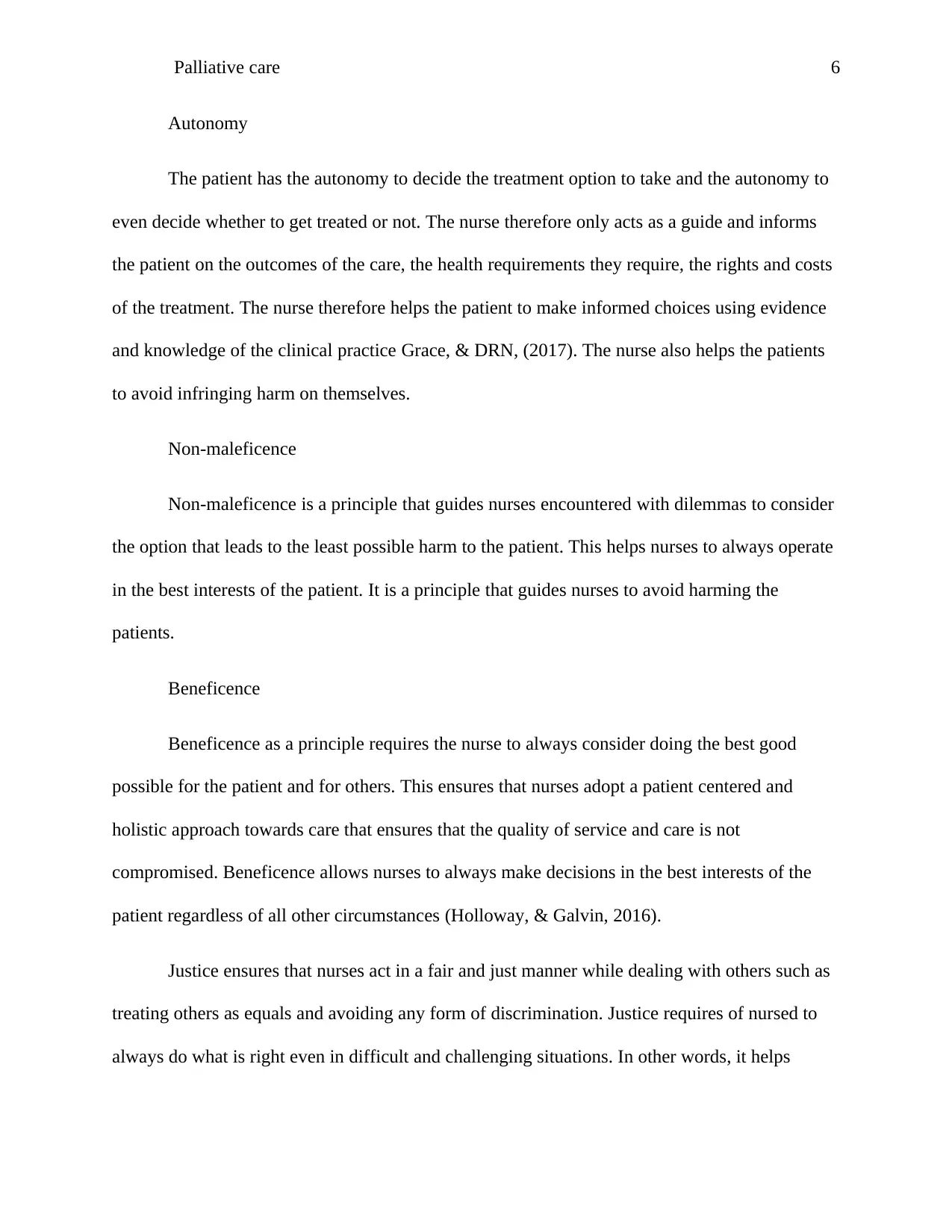
Palliative care 6
Autonomy
The patient has the autonomy to decide the treatment option to take and the autonomy to
even decide whether to get treated or not. The nurse therefore only acts as a guide and informs
the patient on the outcomes of the care, the health requirements they require, the rights and costs
of the treatment. The nurse therefore helps the patient to make informed choices using evidence
and knowledge of the clinical practice Grace, & DRN, (2017). The nurse also helps the patients
to avoid infringing harm on themselves.
Non-maleficence
Non-maleficence is a principle that guides nurses encountered with dilemmas to consider
the option that leads to the least possible harm to the patient. This helps nurses to always operate
in the best interests of the patient. It is a principle that guides nurses to avoid harming the
patients.
Beneficence
Beneficence as a principle requires the nurse to always consider doing the best good
possible for the patient and for others. This ensures that nurses adopt a patient centered and
holistic approach towards care that ensures that the quality of service and care is not
compromised. Beneficence allows nurses to always make decisions in the best interests of the
patient regardless of all other circumstances (Holloway, & Galvin, 2016).
Justice ensures that nurses act in a fair and just manner while dealing with others such as
treating others as equals and avoiding any form of discrimination. Justice requires of nursed to
always do what is right even in difficult and challenging situations. In other words, it helps
Autonomy
The patient has the autonomy to decide the treatment option to take and the autonomy to
even decide whether to get treated or not. The nurse therefore only acts as a guide and informs
the patient on the outcomes of the care, the health requirements they require, the rights and costs
of the treatment. The nurse therefore helps the patient to make informed choices using evidence
and knowledge of the clinical practice Grace, & DRN, (2017). The nurse also helps the patients
to avoid infringing harm on themselves.
Non-maleficence
Non-maleficence is a principle that guides nurses encountered with dilemmas to consider
the option that leads to the least possible harm to the patient. This helps nurses to always operate
in the best interests of the patient. It is a principle that guides nurses to avoid harming the
patients.
Beneficence
Beneficence as a principle requires the nurse to always consider doing the best good
possible for the patient and for others. This ensures that nurses adopt a patient centered and
holistic approach towards care that ensures that the quality of service and care is not
compromised. Beneficence allows nurses to always make decisions in the best interests of the
patient regardless of all other circumstances (Holloway, & Galvin, 2016).
Justice ensures that nurses act in a fair and just manner while dealing with others such as
treating others as equals and avoiding any form of discrimination. Justice requires of nursed to
always do what is right even in difficult and challenging situations. In other words, it helps
⊘ This is a preview!⊘
Do you want full access?
Subscribe today to unlock all pages.

Trusted by 1+ million students worldwide
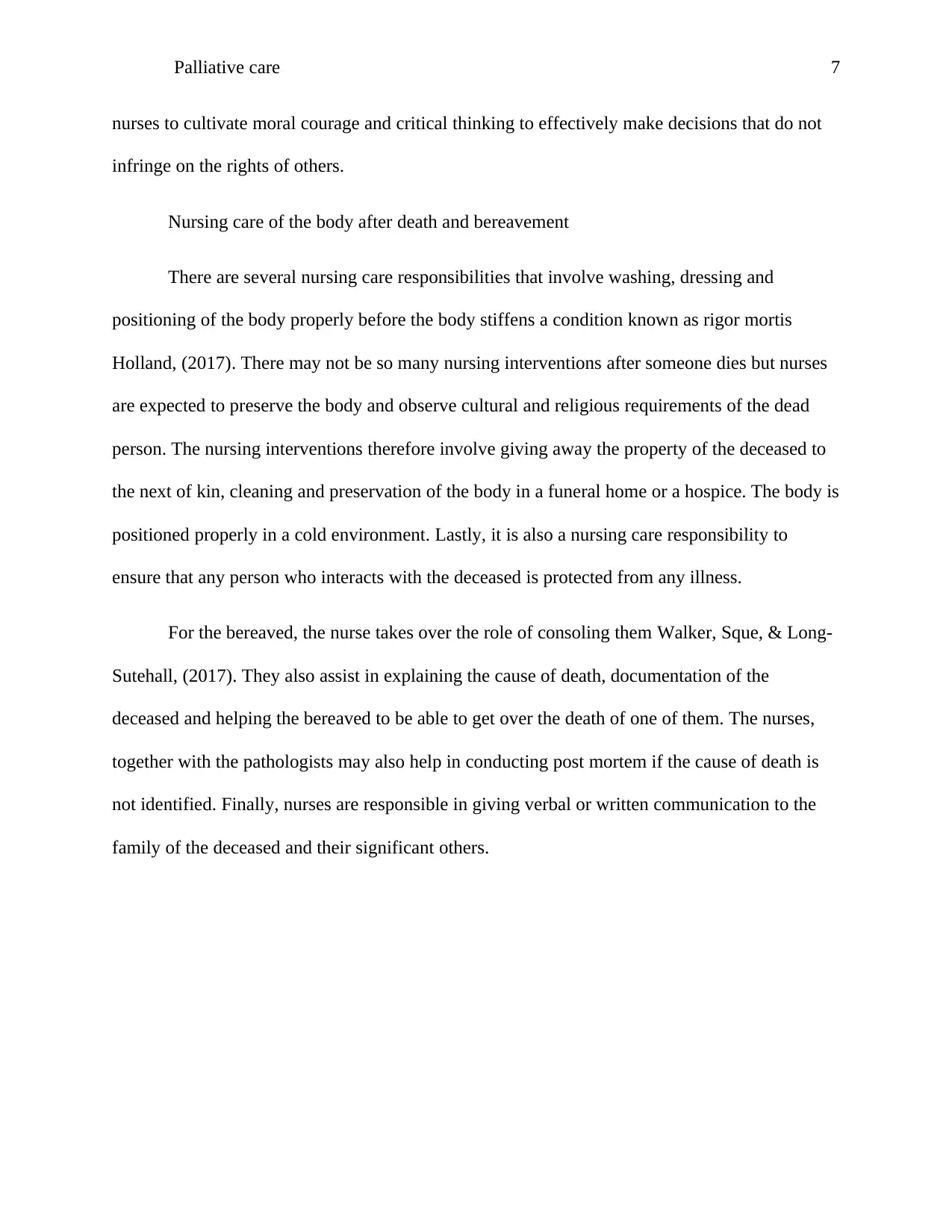
Palliative care 7
nurses to cultivate moral courage and critical thinking to effectively make decisions that do not
infringe on the rights of others.
Nursing care of the body after death and bereavement
There are several nursing care responsibilities that involve washing, dressing and
positioning of the body properly before the body stiffens a condition known as rigor mortis
Holland, (2017). There may not be so many nursing interventions after someone dies but nurses
are expected to preserve the body and observe cultural and religious requirements of the dead
person. The nursing interventions therefore involve giving away the property of the deceased to
the next of kin, cleaning and preservation of the body in a funeral home or a hospice. The body is
positioned properly in a cold environment. Lastly, it is also a nursing care responsibility to
ensure that any person who interacts with the deceased is protected from any illness.
For the bereaved, the nurse takes over the role of consoling them Walker, Sque, & Long-
Sutehall, (2017). They also assist in explaining the cause of death, documentation of the
deceased and helping the bereaved to be able to get over the death of one of them. The nurses,
together with the pathologists may also help in conducting post mortem if the cause of death is
not identified. Finally, nurses are responsible in giving verbal or written communication to the
family of the deceased and their significant others.
nurses to cultivate moral courage and critical thinking to effectively make decisions that do not
infringe on the rights of others.
Nursing care of the body after death and bereavement
There are several nursing care responsibilities that involve washing, dressing and
positioning of the body properly before the body stiffens a condition known as rigor mortis
Holland, (2017). There may not be so many nursing interventions after someone dies but nurses
are expected to preserve the body and observe cultural and religious requirements of the dead
person. The nursing interventions therefore involve giving away the property of the deceased to
the next of kin, cleaning and preservation of the body in a funeral home or a hospice. The body is
positioned properly in a cold environment. Lastly, it is also a nursing care responsibility to
ensure that any person who interacts with the deceased is protected from any illness.
For the bereaved, the nurse takes over the role of consoling them Walker, Sque, & Long-
Sutehall, (2017). They also assist in explaining the cause of death, documentation of the
deceased and helping the bereaved to be able to get over the death of one of them. The nurses,
together with the pathologists may also help in conducting post mortem if the cause of death is
not identified. Finally, nurses are responsible in giving verbal or written communication to the
family of the deceased and their significant others.
Paraphrase This Document
Need a fresh take? Get an instant paraphrase of this document with our AI Paraphraser
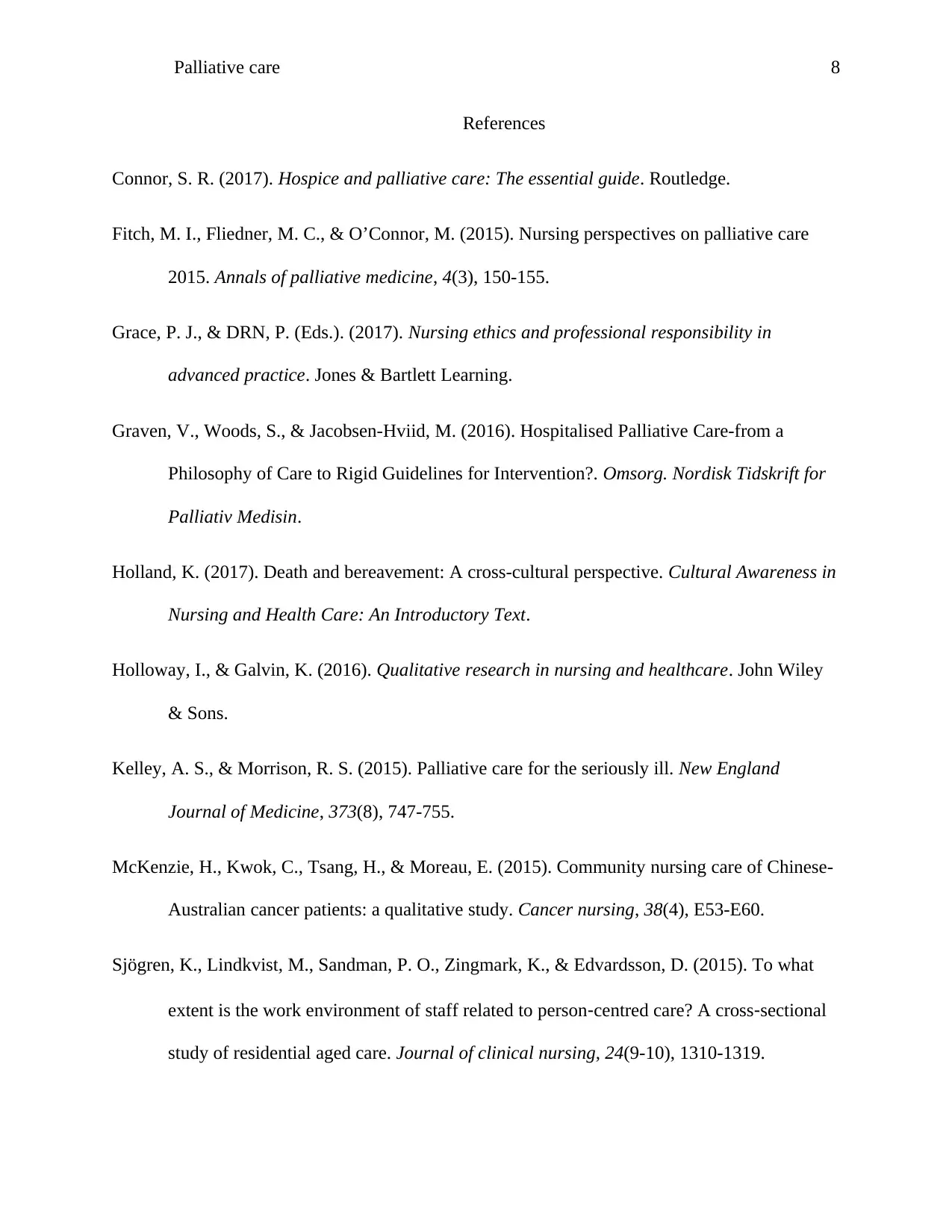
Palliative care 8
References
Connor, S. R. (2017). Hospice and palliative care: The essential guide. Routledge.
Fitch, M. I., Fliedner, M. C., & O’Connor, M. (2015). Nursing perspectives on palliative care
2015. Annals of palliative medicine, 4(3), 150-155.
Grace, P. J., & DRN, P. (Eds.). (2017). Nursing ethics and professional responsibility in
advanced practice. Jones & Bartlett Learning.
Graven, V., Woods, S., & Jacobsen-Hviid, M. (2016). Hospitalised Palliative Care-from a
Philosophy of Care to Rigid Guidelines for Intervention?. Omsorg. Nordisk Tidskrift for
Palliativ Medisin.
Holland, K. (2017). Death and bereavement: A cross-cultural perspective. Cultural Awareness in
Nursing and Health Care: An Introductory Text.
Holloway, I., & Galvin, K. (2016). Qualitative research in nursing and healthcare. John Wiley
& Sons.
Kelley, A. S., & Morrison, R. S. (2015). Palliative care for the seriously ill. New England
Journal of Medicine, 373(8), 747-755.
McKenzie, H., Kwok, C., Tsang, H., & Moreau, E. (2015). Community nursing care of Chinese-
Australian cancer patients: a qualitative study. Cancer nursing, 38(4), E53-E60.
Sjögren, K., Lindkvist, M., Sandman, P. O., Zingmark, K., & Edvardsson, D. (2015). To what
extent is the work environment of staff related to person‐centred care? A cross‐sectional
study of residential aged care. Journal of clinical nursing, 24(9-10), 1310-1319.
References
Connor, S. R. (2017). Hospice and palliative care: The essential guide. Routledge.
Fitch, M. I., Fliedner, M. C., & O’Connor, M. (2015). Nursing perspectives on palliative care
2015. Annals of palliative medicine, 4(3), 150-155.
Grace, P. J., & DRN, P. (Eds.). (2017). Nursing ethics and professional responsibility in
advanced practice. Jones & Bartlett Learning.
Graven, V., Woods, S., & Jacobsen-Hviid, M. (2016). Hospitalised Palliative Care-from a
Philosophy of Care to Rigid Guidelines for Intervention?. Omsorg. Nordisk Tidskrift for
Palliativ Medisin.
Holland, K. (2017). Death and bereavement: A cross-cultural perspective. Cultural Awareness in
Nursing and Health Care: An Introductory Text.
Holloway, I., & Galvin, K. (2016). Qualitative research in nursing and healthcare. John Wiley
& Sons.
Kelley, A. S., & Morrison, R. S. (2015). Palliative care for the seriously ill. New England
Journal of Medicine, 373(8), 747-755.
McKenzie, H., Kwok, C., Tsang, H., & Moreau, E. (2015). Community nursing care of Chinese-
Australian cancer patients: a qualitative study. Cancer nursing, 38(4), E53-E60.
Sjögren, K., Lindkvist, M., Sandman, P. O., Zingmark, K., & Edvardsson, D. (2015). To what
extent is the work environment of staff related to person‐centred care? A cross‐sectional
study of residential aged care. Journal of clinical nursing, 24(9-10), 1310-1319.
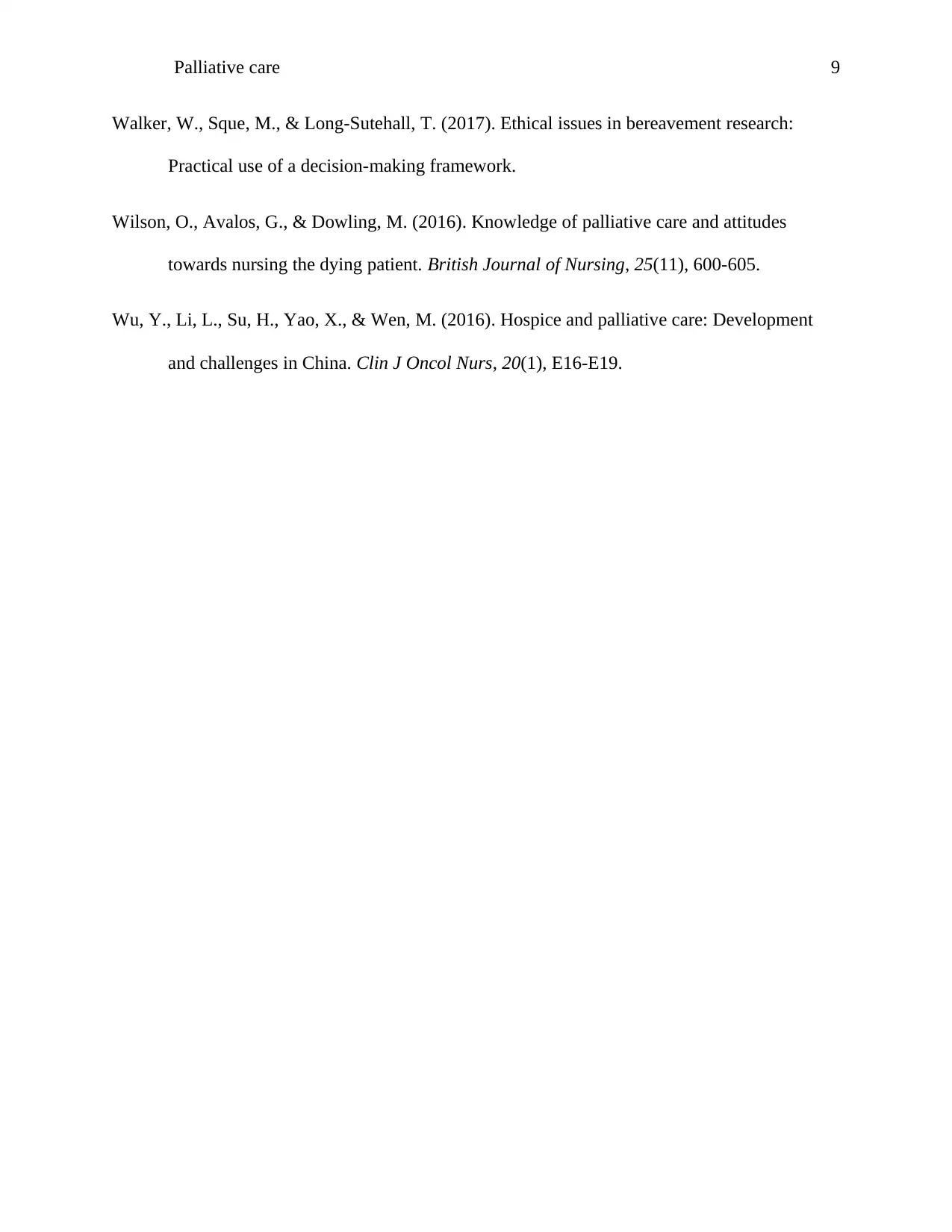
Palliative care 9
Walker, W., Sque, M., & Long-Sutehall, T. (2017). Ethical issues in bereavement research:
Practical use of a decision-making framework.
Wilson, O., Avalos, G., & Dowling, M. (2016). Knowledge of palliative care and attitudes
towards nursing the dying patient. British Journal of Nursing, 25(11), 600-605.
Wu, Y., Li, L., Su, H., Yao, X., & Wen, M. (2016). Hospice and palliative care: Development
and challenges in China. Clin J Oncol Nurs, 20(1), E16-E19.
Walker, W., Sque, M., & Long-Sutehall, T. (2017). Ethical issues in bereavement research:
Practical use of a decision-making framework.
Wilson, O., Avalos, G., & Dowling, M. (2016). Knowledge of palliative care and attitudes
towards nursing the dying patient. British Journal of Nursing, 25(11), 600-605.
Wu, Y., Li, L., Su, H., Yao, X., & Wen, M. (2016). Hospice and palliative care: Development
and challenges in China. Clin J Oncol Nurs, 20(1), E16-E19.
⊘ This is a preview!⊘
Do you want full access?
Subscribe today to unlock all pages.

Trusted by 1+ million students worldwide
1 out of 9
Related Documents
Your All-in-One AI-Powered Toolkit for Academic Success.
+13062052269
info@desklib.com
Available 24*7 on WhatsApp / Email
![[object Object]](/_next/static/media/star-bottom.7253800d.svg)
Unlock your academic potential
Copyright © 2020–2026 A2Z Services. All Rights Reserved. Developed and managed by ZUCOL.





